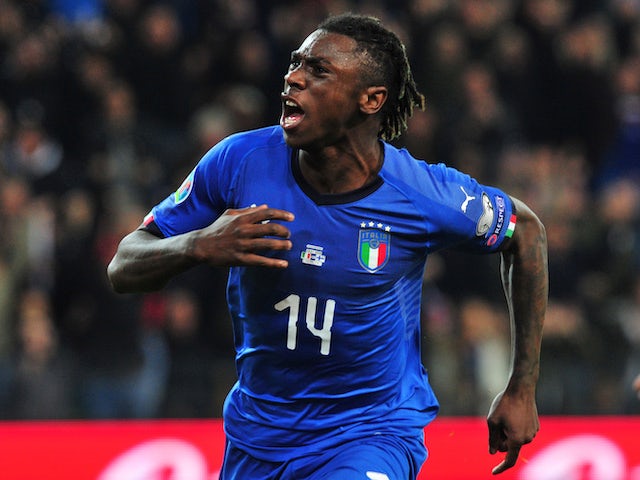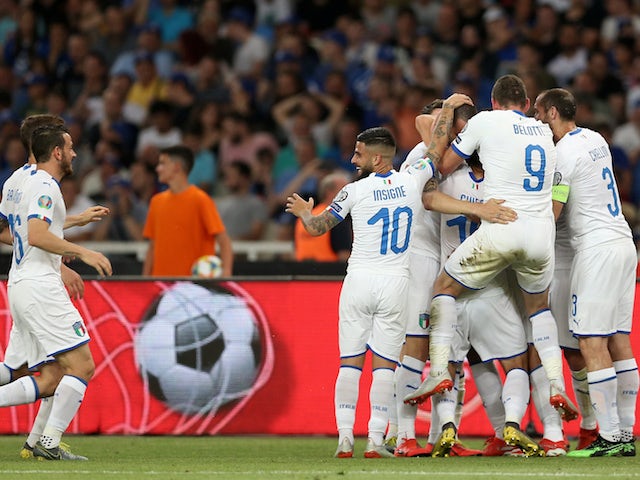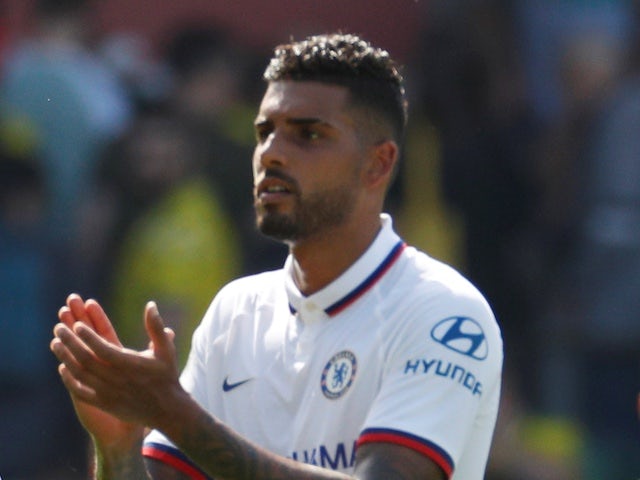Italy welcome Greece to the Stadio Olimpico in a qualifier on Saturday night knowing that victory would more or less guarantee them a place at Euro 2020.
The Azzurri have a perfect record in qualifiers so far, winning all six fixtures, and will fancy their chances at home against a Greece side which has heavily underperformed over the last few years.
Match preview
 © Reuters
© ReutersFinishing top of a group containing Finland, Armenia, Greece, Bosnia and Herzegovina and Liechtenstein would not be considered a significant event by any Italian, but reaching the 2020 finals marks the turning of a page for a country which shocked the world by missing out on the 2018 World Cup.
Indeed, for a country whose very DNA contains a deep love for the game, failure to reach the tournament for the first time in 60 years struck at the very heart of the country's public consciousness, prompting widespread calls for deeper structural change around how Italian football operates.
Failure to get past Sweden in a playoff was a shock, but Italy's ability to rank among the very best in the world has gradually diminished over the past decade. Their appearance in the final of Euro 2012, where they were smashed 4-0 by Spain, was sandwiched in between group stage exits from both the 2010 and 2014 World Cup, while nobody would claim that Sweden did not deserve to make the finals ahead of them in 2017.
Under Roberto Mancini, though, results and performances have gradually picked up, prompting the emergence of a new culture which feels younger, fresher, with talents such as Lorenzo Pellegrini, Moise Kean and Federico Bernardeschi taking over from the old guard of Gianluigi Buffon, Giorgio Chiellini and Andrea Barzagli.
Indeed, it is telling that only one player who started against Sweden in 2017 - Leonardo Bonucci - was included in Mancini's most recent starting XI for a 2-1 win over Finland last month.
 © Reuters
© Reuters
With just eight months until Italy returns to a major tournament, Mancini will want to simultaneously keep giving the next generation a chance while also visualising what starting XI he will field in June next year.
For Greece, on the other hand, there are no such prospects for the next generation, with players such as Kostas Manolas and Giorgos Masouras - both of whom have good experience in the Champions League - lacking the same ability to play at the highest standard in their national team.
Moreover, there remains a groundswell of young talent - players like Marios Vrousai, Kostas Tsimikas and Dimitris Giannoulis - who are capped at senior level but lack the same horizon to aim for as other European players of equal ability.
While the mention of Greece in the Euros immediately brings back memories of the country's remarkable 2004 triumph, their recent form on the continental stage is bettered by teams like Kosovo, North Macedonia, Cyprus and Albania, who all have more points than the Greeks after six qualifying fixtures.
Under the watch of John van 't Schip, appointed as manager in July, Greece were on the receiving end of a home defeat to Estonia and drew with Liechtenstein, and have managed just two victories - one of them coming against Liechtenstein - in their last 10 outings.
For a country whose inhabitants live and breathe football just like the Italians, it is unfortunate that the health of its national side comes up against the backdrop of a league struggling with financial issues and still reeling from a major corruption scandal in 2015.
Recent Italy form: WWWWWW
Recent Greece form: DLLLLD
Team News
 © Reuters
© ReutersMancini will be without Chelsea full-back Emerson Palmieri after the defender suffered a thigh problem against Finland last month, with Frank Lampard confirming that he would not return until after the international break.
The boss will also have to do without exciting midfielder Stefano Sensi, who has a thigh injury, while goalkeeper Gianluigi Donnarumma is also a doubt due to a stomach problem.
Juventus full-back Mattia De Sciglio also finds himself sidelined for this game having suffered an injury back in August from which he is yet to recover, while Pellegrini is definitely out due to a broken foot.
For Greece, the medical staff will make a late decision over the talismanic Manolas, who picked up a muscle injury just before the international break. Lazaros Christodoulopoulos, on the other hand, is definitely out.
Kostas Fortounis, widely regarded as one of Greece's most exciting talents, is out on a long-term basis having suffered an ACL injury.
Italy possible starting lineup:
Sirigu; Izzo, Bonucci, Acerbi, Florenzi; Verratti, Jorginho, Barella; Bernardeschi, Immobile, Chiesa
Greece possible starting lineup:
Barkas; Bakakis, Siovas, Sokratis, Stafylidis; Bouchalakis, Kourbelis; Masouras, Vrousai, Fetfatzidis; Koulouris
![]()
We say: Italy 3-0 Greece
Having inflicted the same scoreline on Greece in Athens back in June, you suspect that this new-look, youthful Italy team will enjoy itself against a visiting team whose morale and capacity for picking up results is approaching an all-time low.
No Data Analysis info











